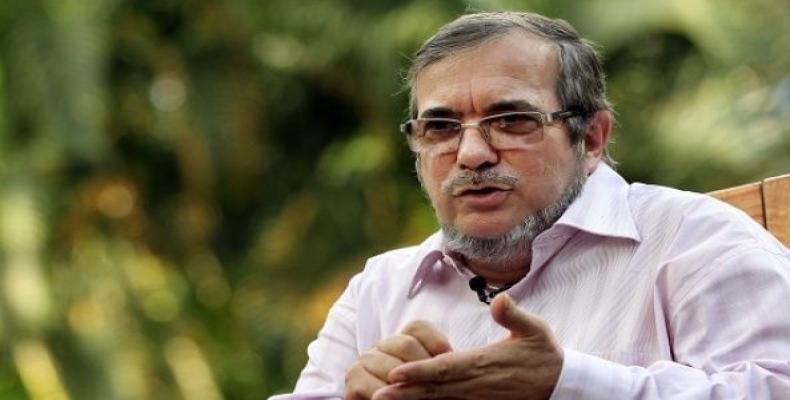Bogota, September 28 (RHC)-- In Colombia, rebel FARC leader Rodrigo Londono -- also known as Timoleon Jimenez or “Timochenko -- has accused the Colombian government of failing to meet the terms of the peace deal. In an open letter addressed to Colombian President Juan Manuel Santos, Londono says that hundreds of FARC prisoners remain in jail despite amnesty laws and decrees.
"A true campaign of hatred and smearing is being lashed against us. The reconciliation we dreamed of is being stranded, pushed down by those committed to deny us a space in Colombia. It is as if the end of conflict and the building of a just and lasting peace had not been agreed. Therefore I wanted to raise a voice of alarm," he wrote in the letter. He adds that the state has also failed to suspend arrest warrants for FARC members.
"There are thousands of ex-combatants ... who do not receive the monthly payment of 90 percent of the minimum wage" which had been agreed, and they still had no access to health care, he said. Timochenko emphasized that the FARC was committed to the “sacred” Havana peace accord but was concerned by the government's inaction — particularly with respect to the rise of paramilitary groups.
The FARC leader said that the country's attorney general has spared no effort to subject legislative reforms necessary for the deal's implementation to “serious institutional mutilations” while effectively shielding paramilitaries from being investigated and rooted out. The killings of social movement leaders and people's representatives have continued unabated on a near-daily basis, he said, while the Colombian National Police mobile riot squad or ESMAD continues to repress poor communities.
Since the peace accords were signed, paramilitaries have sought to gain control of strategic locales abandoned by the FARC that are fit for mechanized small-scale gold mining, the processing of coca leaves into cocaine paste, and other illicit operations.
Communities have witnessed an uptick in right-wing terror operations committed by non-state actors such as the Gaitanista Self-Defense Forces of Colombia, known by its Spanish acronym AGC, especially in contested regions like the state of Choco. Armed right-wing gangs have also inflicted violence on local populations who live in close proximity to roads and highways passing through communities previously controlled by the FARC, especially those granting access to ports and lucrative Pacific Ocean drug trafficking routes.
The peace agreement between the FARC and the Colombian government sought to end over half-century of armed conflict which left some 260,000 people confirmed dead, 60,000 unaccounted for and 7 million displaced. As part of the terms, the FARC disarmed and relaunched as a political party, changing their name to the Common Alternative Revolutionary Force.
“The process of abandoning of arms has been carried out with maximum good faith and in the same way we published the inventory of our war economy,” Londono said. “We are a political party that begins to work in a legal framework, without any weapon but our voice.”


